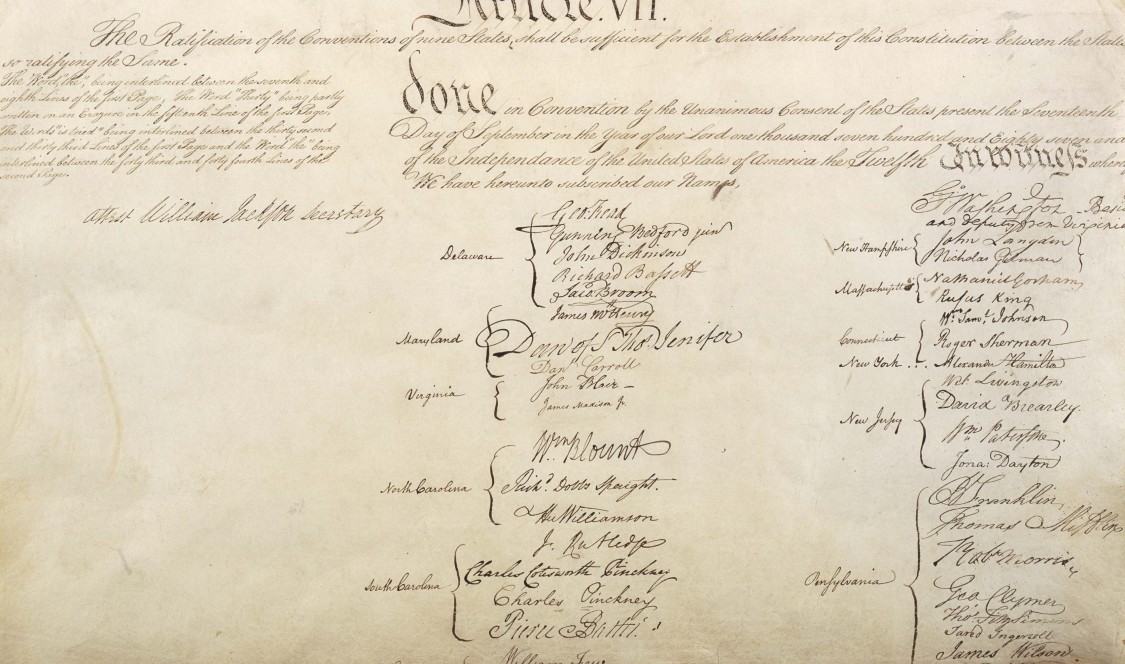Claremont McKenna College announced today that its second annual Dreier Roundtable Conference will take place with a half-day event at CMC on Oct. 9 that will discuss the roots of political conflict that exist in divergent visions of the U.S. Constitution.
The purpose of the conference is to engage students, political practitioners and faculty in a discussion of the structural problems of American institutions. The conference is part of a bipartisan public forum that includes panelists from the Brookings Institution, the American Enterprise Institute, and The New York Times; as well as former members of the U.S. House and Senate and academics from CMC, Pomona College and Johns Hopkins University.
Since the American founding, broad agreement on the republican principles embodied in the Constitution has long been a necessary condition for legitimate political conflict. But what if the broad consensus over the Constitution breaks down? What if the nature of the conflict that currently animates our politics, which has often been encapsulated by the term “polarization,” is in fact the result of underlying disagreements on the basis of the American regime? Are we primarily attempting to manage conflict among factions with differing conceptions of constitutional order?
The Dreier Roundtable at Claremont McKenna College is organizing a yearlong research project for the 2015-16 academic year devoted to examining the constitutional roots of political conflict in American politics. Through a series of conference meetings, convening events, and commissioned working papers leading to a published edited volume with a major academic press, the Roundtable will contribute to our national dialogue on American republican principles and the political competition over visions of the Constitution.
The Roundtable is an innovative new public policy initiative at Claremont McKenna College that convenes leaders in politics, business, journalism and academia to hold constructive, substantive public discussions about issues that affect the future prosperity of the United States and the world.
The Dreier Roundtable’s first event at the Oct. 9 conference will feature an economic panel discussion entitled “Federal Reserve: Administration vs. Accountability,” followed by a political panel discussion, “Examining Polarization in the Supreme Court.” A plenary roundtable session will then take place addressing the “Roots of Polarization in our Constitutional Order.”
Event Information
Economics Panel – “Federal Reserve: Administration vs. Accountability,” 8:30 – 9:45am, Freeberg Forum, Kravis Center, Lower Level, #62
Since its establishment in 1918, the Federal Reserve has been an exemplar of the Progressive Era’s faith in rule by experts over rule by politicians. But is the Fed an ideal of expert administration and a progressive success story? Or does the Fed benefit from a contingent moment of broad consensus on inflation? Can the Fed actually affect policy change beyond its remit on inflation, in areas like unemployment?
- Scott Sumner—Ralph G. Hawtrey Chair of Monetary Policy at the Mercatus Center at George Mason University, professor of economics at Bentley University
- Alex Pollock—Resident Fellow, American Enterprise Institute
- Binyamin Appelbaum— is a Washington correspondent for The New York Times who covers the Federal Reserve and other aspects of economic policy
- Moderated by Eric Helland—William F. Podlich Professor of Economics and George R. Roberts Fellow at Claremont McKenna College
Political Panel – “Examining Polarization in the Supreme Court,” 10:00 – 11:15am, Freeberg Forum, Kravis Center, Lower Level, #62
The lack of consensus on the limitations of the Constitution is acutely reflected in the increasing focus on the Supreme Court to manage widening conceptions of American politics.
- Amanda Hollis-Brusky—Assistant Professor, Department of Politics, Pomona College. Author of Ideas With Consequences: The Federalist Society and the Conservative Counterrevolution (Oxford, 2015)
- Steve Teles—Associate Professor of Political Science at Johns Hopkins University. Author of Rise of the Conservative Legal Movement: The Battle for Control of the Law (Princeton, 2008)
- Tom Campbell—Dean of Chapman University School of Law and former five-term member of the U.S. House of Representatives
- Moderated by Kenneth Miller—Associate Professor of Government at Claremont McKenna College and author of Direct Democracy and the Courts
- Closing remarks by Spencer Abraham, former U.S. Energy Secretary and U.S. senator from Michigan.
Roundtable Discussion – “Examining the Roots of Polarization in our Constitutional Order,” 11:30 – 1 p.m., Security Pacific Dining Room, Marian Miner Cook Athenaeum
Live streaming of this event will be available at www.cmc.edu.
Examine the competition visions of the Constitution, how they manifest within our political parties and issues cleavages, and how they distort our politics.
David Dreier—longtime chairman of the House Rules Committee, 32-year veteran of Congress and recent appointee of Secretary of State John Kerry’s Foreign Affairs Policy Board. He is a trustee and alumnus of Claremont McKenna College and distinguished fellow at the Brookings Institution
Tom Campbell—Dean of Chapman University School of Law and former five-term member of the U.S. House of Representatives
Thomas E. Mann—Senior Fellow in Governance Studies at The Brookings Institution and Resident Scholar, Institute of Governmental Studies, University of California, Berkeley. Mann held the W. Averell Harriman Chair at Brookings 1991-2014 and was Director of Governmental Studies from 1987 to 1999
Moderated by Zachary Courser—Research Director, Dreier Roundtable, and Visiting Assistant Professor of Government at Claremont McKenna College
More information at drt.cmc.edu.

